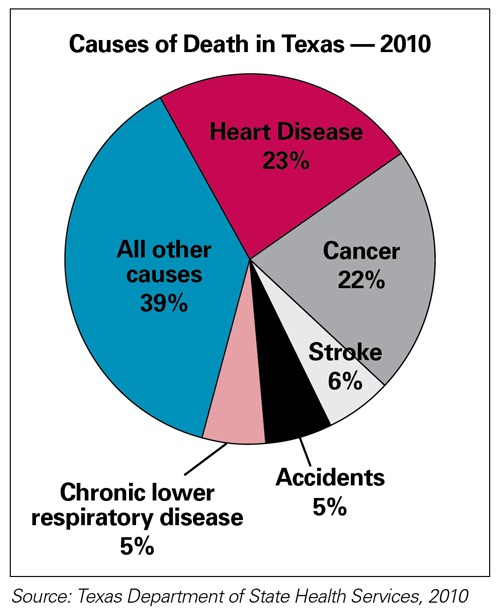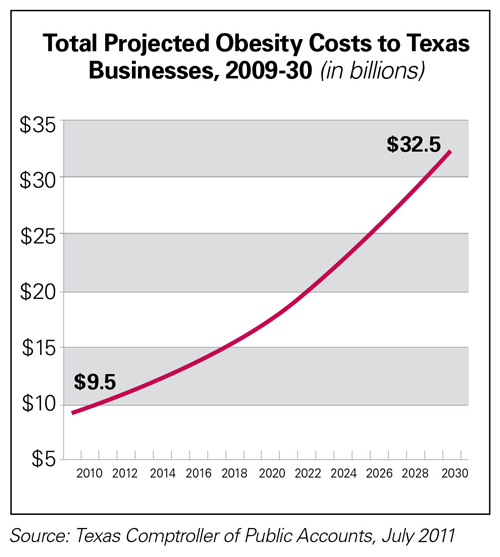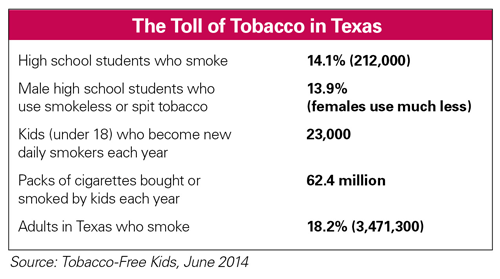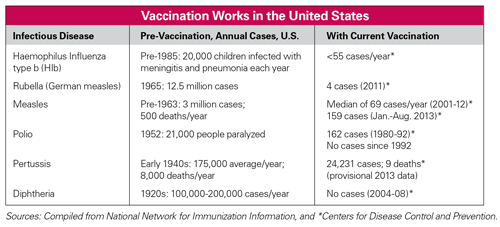One of the keys to maintaining health lies in physicians helping patients take responsibility for their own health. Competent, compassionate medical care — delivered with professionalism, state-of-the-art clinical knowledge, and patient respect — helps patients assume responsibility. Conversely, patients have a duty to make informed, healthy decisions and share in the consequences of their decisions.
Over the past century, public health interventions such as pasteurization, vaccinations, safe drinking water, and seatbelts have reduced — and in some cases eliminated — illness and death. Each occurrence of preventable infectious or chronic disease is costly to Texas’ government, taxpayers, business, our economy, and our patients.
Many of the health and wellness issues people face depend on the decisions they make and the social and environmental factors they are exposed to throughout their lifetime. Four out of 10 Texas adults report having at least one factor — high cholesterol, obesity, high blood pressure, a sedentary lifestyle, or a smoking habit — that puts them at high risk of developing a chronic disease.
Reduce barriers to healthy eating and physical activity
Obesity and being overweight contribute to diabetes, hypertension, heart disease, cancer, and stroke. Unfortunately, Texas has a growing obesity crisis. Thirty-seven percent of Texas adults are overweight, while 29 percent are obese[36] — placing Texas among the 20 states with the highest obesity rates. During the past three decades, obesity rates in children have more than tripled. Today, 32 percent of Texas children (aged 10- 17) are obese. This not only increases their risk of being overweight or obese as adults, it also puts them at greater risk for chronic disease and other lifelong health problems as well as a shorter lifespan. A child who is overweight at age 12 has a 75-percent chance of being overweight or obese as an adult.

Many of the leading causes of death and disability in Texas and the United States today are preventable. We need to better educate Texans so they can live healthier lives.
Improved physical health in students has been linked to academic success. Conversely, children with obesity are more prone to absences and lower grades. In the United States, students who are physically active at least 60 minutes on most days, play on at least one sports team, or watch fewer than three hours of television per day consistently earn “mostly A’s.” Unfortunately, the physical health of our students has been further compromised by the Texas Legislature’s action to reduce health education requirements.

The obesity epidemic, and the ever-younger age groups it strikes, threatens Texas’ physical and fiscal health. Texas’ continually expanding waistline correlates with increased health care costs. Obesity is responsible for 27 percent of the growth in health care spending. Treating obese patients costs 37 percent more than treating normal-weight patients. And over the course of a patient’s lifetime, the per-person costs of obesity appear to be the same as the costs for smoking.[37]
The rise in overweight and obesity also is affecting the bottom line of Texas employers. In 2009, the Texas Comptroller’s Office found that obesity costs Texas businesses an estimated $9.5 billion due to higher employee insurance costs, absenteeism, and other effects. Left unchecked, obesity could cost employers $32.5 billion annually by 2030.[38]
TMA recognizes there is no single solution to preventing or addressing the negative impacts of obesity. Physicians, communities, parents, schools, and workplaces must pursue multiple, scientifically proven approaches. Each must identify potential barriers to implementing local approaches for dealing with this growing crisis. Our legislative leaders can also play an important role by creating and promoting good health care policy that improves the health of Texans.
Texas Public Health Coalition
TMA created the Texas Public Health Coalition in 2007. It consists of 30 organizations dedicated to advancing core public health principles at the state and community levels. The coalition represents the voice of the Texas health care community on matters that impact the public most, and ensures policymakers have the tools they need to make wise and balanced public health policy. Its three primary goals are to improve Texas’ vaccination rates, reduce tobacco use, and curb Texas’ obesity epidemic.
Tackle the ills of smoking and tobacco use
While tobacco use is decreasing, Texas still continues to have higher rates of death attributable to smoking — 273 per 100,000, which is 10 percent greater than the national average of 248.5 per 100,000.[39] A major way to decrease smoking-attributable illnesses and deaths is by preventing minors and young adults from ever taking up the tobacco habit. More than two out of three of Texas’ adult smokers started smoking regularly at age 18 or younger, and 85 percent started at age 21 or younger.[40] The Centers for Disease Control and Prevention (CDC) estimates about 23,000 Texas minors start smoking each year.
Smoking during pregnancy is of particular concern to physicians because of the increased risk of preterm births; it’s a factor in 20 to 30 percent of low-birth weight births. And while the percent of women who smoke during pregnancy has declined significantly, the highest rates are among teenagers (16.7 percent) and women aged 20-24 (18.6 percent).[41]
While cigarettes, cigars, and smokeless tobacco (chewing tobacco and snuff) are the most widely used tobacco products, some new products are attracting the interest of minors. Electronic cigarettes or “e-cigarettes” are widely accessible and growing in popularity. Several states have already passed legislation to include e-cigarettes in nonsmoking laws or to restrict the sale of e-cigarettes to minors.[42] TMA is calling on lawmakers to restrict the purchase of e-cigarettes by minors, adopt appropriate regulations for e-cigarettes, and ensure the current smoking prohibitions include e-cigarettes. Physicians are concerned that the use of e-cigarettes by minors could be a pathway to future tobacco use and nicotine addiction.
Tobacco use comes with a high consequential price tag; it’s estimated to be more than $20 billion every year, including $7.5 billion in direct health care expenditures, almost $5 billion in decreased workplace productivity, and $7.9 billion in premature death.[43] The American Cancer Society estimates Texas could save $207 million over five years by implementing comprehensive smoke-free legislation. Savings are achieved from fewer heart attacks, strokes, and lung cancer, and from decreased pregnancy complications associated with tobacco use.[44]

Texas has yet to enact any sort of statewide smoke-free legislation. TMA will continue its support of this legislation and local efforts to make Texas smoke free and to fund important state tobacco cessation programs.
Improve vaccination rates to control infectious diseases
Vaccinations are one of the safest and most cost-effective ways to prevent infectious diseases. While Texas has worked to vaccinate more young children, coverage rates for this age group are not improving in Texas or the United States. In fact, overall rates may actually be declining. Much of this is due to parental decisions not to vaccinate their children, exposing entire communities to potential outbreaks. Properly vaccinating all children born in the United States would prevent an estimated 20 million cases of disease during their lifetime and 42,000 premature deaths. For every dollar spent on childhood vaccination, we save a minimum of $10 in direct and indirect costs, such as avoiding hospitalization, lost work time, disability, and disease outbreak investigations.

But vaccinating our children is not enough. Adult immunization also prevents infectious diseases, and vaccination rates for this population are significantly lower than rates for children. Bacterial pneumonia was the leading factor in more than 20 percent of the 1.4 million potentially preventable hospitalizations of Texas adults (2006-11), with hospital charges totaling more than $9.6 billion. Routine vaccination of older and high-risk adults for bacterial pneumonia has been shown to decrease these preventable hospitalizations. Adult vaccinations also protect infants and people who cannot be vaccinated. Recent outbreaks of pertussis, measles, and influenza underscore the importance of improving Texas’ adult vaccination rates.
Infectious disease knows no border
Infectious diseases can easily be reintroduced to Texas’ unvaccinated communities, as illustrated in 2013, when a person traveling to Asia returned with the measles and interacted with a vaccine-hesitant community. In a matter of weeks, 20 additional people were infected. In total, 27 measles cases were reported in 2013, the highest annual case count in more than 20 years. This added unnecessary burdens on the local health care system and translated into significant and unnecessary costs to local, state, and federal taxpayers.
TMA’s top concern during the 2014 Central American immigration crisis was to ensure children and their guardians received timely and needed medical aid. Physicians from El Paso to Brownsville volunteered their time and effort so the Central Americans received appropriate preventive screenings before they traveled into the United States. These actions not only protected the immigrants from further sickness, it also protected Texans from infectious diseases, especially because of the disturbing trend in Texas not to vaccinate. Many serious infectious diseases are preventable. That’s why the state and federal government has a vested interest in ensuring all persons are properly vaccinated.
A robust vaccination registry saves lives and money
Texas’ immunization registry, ImmTrac, is opt-in; individuals must inform the state they want their vaccination information in the registry. To protect Texans against preventable diseases, it’s imperative for the state to have an efficient and robust registry. This means 1) increasing the public’s awareness of ImmTrac; 2) making it easier for individuals and physicians to register; 3) maintaining individual information in the registry throughout adulthood (unless an individual opts out); and 4) using de-identified data in ImmTrac to enable parents, public health officials, and physicians to assess vaccination coverage in their communities and schools. It’s important to monitor areas with high vaccination exemption rates to determine if exemptions are contributing to ongoing disease outbreaks in Texas.
Texas is one of only 18 states that allow an individual or a parent of a child to exempt themselves from a required school or work vaccination solely for a personal belief.[45] Most states only allow vaccination exemptions based on medical contraindications or religious reasons. Local health departments, school districts, and parents should have access to vaccine-exemption information to better plan and implement vaccination efforts in those areas of the state at risk of vaccine-preventable diseases.
TMA improves vaccination rates in local communities
TMA launched Be Wise — ImmunizeSM in 2004 to improve Texas’ childhood vaccinations rates through action, education, and outreach. TMA physicians, medical students, and the TMA Alliance create awareness about the importance of vaccinations in their communities through educational and free and low-cost vaccination clinics. The program also now includes adolescent and adult vaccination outreach. Be Wise — Immunize has administered more than 250,000 vaccinations since its inception. The program is funded through a grant from the TMA Foundation. H-E-B and TMF Health Quality Institute provided major support for the Be Wise — Immunize program in 2013 and 2014.
Be Wise — Immunize is a service mark of the Texas Medical Association
Increase Texas funding for mental health
A recent study estimates that Texas spends more than $13 billion each year on mental health care. About one in four adults is affected by mental illness each year, and almost half of all adults are expected to be affected by mental illness during their lifetime.
Mental illness and substance abuse hurt the Texas economy through lost earning potential and the costs of treating coexisting conditions, disability payments, homelessness, and incarceration. More than 8 percent of Texas adults report current depression, and 5.2 percent report serious psychological distress.
Each year, the CDC estimates that 13-20 percent of U.S. children experience a mental disorder.[46] In 2011, almost 30 percent of Texas high school students (and 36.9 percent of female students) reported they felt sad or hopeless almost every day for at least two weeks. Suicide is one of the 10 leading causes of death for all Texans under age 65 years and is the second leading cause of death for those aged 15-34 years (2010).
Substance use disorders and addictions to alcohol and legal and illegal substances are often associated with mental illness. People with untreated mental illness are often unable to make healthy decisions, making them more likely to practice high-risk behaviors such as alcohol, tobacco, and illicit drug use. This often contributes to the development of the serious chronic health conditions associated with those behaviors. They also are more likely to practice behaviors that put them at greater risk of contracting diseases such as HIV, hepatitis, and sexually transmitted infections. According to the Substance Abuse and Mental Health Services Administration, more than 500,000 Texans aged 12 or older per year in 2008-12 reported they were dependent on or abused illicit drugs — 41,000 received treatment for their illicit drug use during this time.
Texas public officials have recognized that people with mental illnesses are disproportionately residing in Texas prisons and jails. In 2012, nearly 20 percent of the adult offenders in Texas state prisons, on parole, or on probation were former patients of Texas’ mental health system.[47]
A Texan with serious mental illness is eight times more likely to be in a jail than in a hospital or treatment program, at a cost to the state of $50,000 per year.
TMA is working to promote and support jail diversion programs in many communities so those with mental illnesses charged with nonviolent crimes have access to community-based support services and treatment. There is growing evidence these are cost-effective strategies in reducing local and state criminal justice system costs.
Reduce avoidable injuries and death
Preventing deaths and disability from motor vehicle accidents is essential. Distracted driving has become a major concern in Texas. In 2013, one out of every five motor vehicle crashes in Texas involved distracted driving, which includes texting, talking on the phone, or performing another task while driving. The Texas Department of Transportation reports that in 2013, almost 20,000 Texans were seriously injured in a crash caused by distracted driving.
TMA strongly supports a statewide ban on texting while driving to ensure the safety of all Texans, particularly young Texans.
Protect Texans’ health and reduce taxpayer costs through clean air and water
Texas physicians have long recognized the impact of our environment on Texans’ physical health. Physicians often are on the front lines of responding to environmental health events or disasters. A wide range of environmental factors cause death, disability, and disease, and affect our quality of life. Many of these are beyond our control. However, man-made problems of concern — including inadequate sanitation and exposure to hazardous substances in our air, water, soil, and food — require vigilance to ensure public health is protected.
Clean air and water are key components of a healthy environment and a healthy population. Many factors influence our air quality and our health. Medical science indicates that too much ground-level ozone over time has negative effects on vulnerable patients, especially those with cardiovascular diseases, asthma, or other respiratory conditions.[48] Coal-fired plants emit dozens of hazardous air pollutants, including sulfur dioxide, dioxins, and mercury. These can cause heart and lung diseases, and can damage the brain, eyes, and skin.
Technology exists to reduce air pollution and stimulate energy savings. Texas needs to take action to establish an energy policy that will clean up the air and encourage nonpolluting, renewable energy sources. Additionally, Texas needs to evaluate and promote energy conservation measures for homes, businesses, and public buildings to decrease energy consumption and reduce the emission of toxins that harm our patients’ health. As such, TMA supports policies calling for retrofitting coal plants to improve emissions.
Maintaining a healthy water supply is essential to the future of Texas. Water pollution is a growing concern to Texas physicians, particularly the effects of toxic elements like methyl mercury on high-risk populations. The public should have access to information about the chemicals to which they have been exposed that could harm their health. The expansion of hydraulic fracturing (“fracking”) has had a tremendous impact on the Texas economy, but concerns are increasing from physicians caring for persons living near fracking areas, and for those employed in the industry. There is a lack of information and research on the chemicals used and the potential health effects of these chemicals on the environment and the population. TMA supports more detailed disclosure of chemicals used in hydraulic fracturing.
TMA has called for the Texas Commission on Environmental Quality to ensure clean air and water for the health of Texans while still meeting the state’s energy needs.

Obesity
- Reinstate the one-half health education credit requirement for a student to graduate from high school.
- Increase state funding for science-based community programming on healthy eating and physical activity.
- Implement science-based recommendations that will improve the quality and quantity of health education, nutrition, physical education, and physical activity in schools.
- Enact science-based policies that address healthy environments and obesity as they relate to physical activity and increased access to affordable and healthy foods.
Tobacco Use
Enact regulation of electronic cigarettes and associated products that includes:
- Restricting their sale to minors,
- Including these in smoking prohibition legislation and local policies,
- Providing school-based education for children on the hazards of electronic cigarettes,
- Assessing the feasibility of taxing electronic cigarettes and associated products to decrease the use of these products, and
- Encourage the U.S. Food and Drug Administration to assess the marketing of electronic cigarettes to minors.
- Maintain funding for the Texas Quitline and the state’s smoking cessation program and require monitoring of electronic cigarette use.
- Make Texas smoke free and encourage cities throughout the state to adopt uniform policies for smoke-free public places, workplaces, restaurants, and bars.
Immunizations
- Increase vaccination funding for Texas’ adult population.
- Study the aggregated impact of personal belief immunization exemptions on the health of Texas’ communities.
- Enable parents, physicians, and public health officials to have access to vaccination exemption information for local schools.
- Change ImmTrac requirements to ensure that after parents have opted their child(ren) into the registry, the records remain until the individual opts out on their own.
Mental Health
- Fund the development of the state’s behavioral health workforce including expansion of residency slots in psychiatry.
- Increase funding for state and local mental health initiatives including support for jail diversion.
- Increase state funding for treatment of higher risk populations such as pregnant women in need of treatment for alcohol or other substance abuse.
Healthy Vision 2020